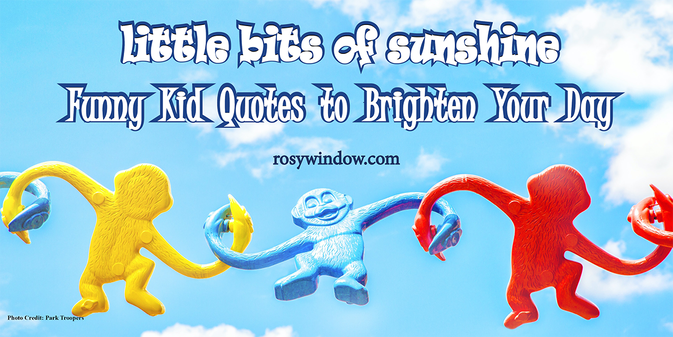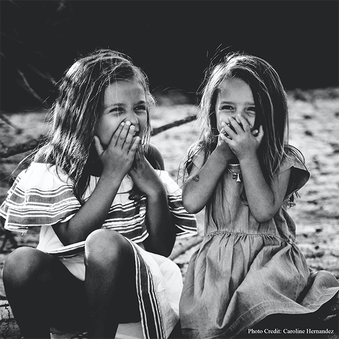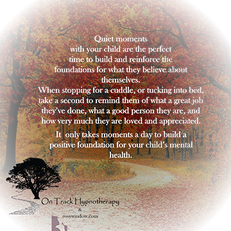|
If you’re anything like me, social media is wearing a little thin on you right now. It’s a tricky thing. You want to check-in, stay updated on what is going on, and stay connected in this time where many of us are practicing social isolation. But, oh man, so much sad, and frustrating news! Listening to people argue, trying to sort out fact from fiction. Wondering if your doing enough, not enough, or too much to keep your loved ones safe; to be a responsible human. I thought it was time for a diversion. Let some tension go and let a little sunshine seep in… and maybe a little laughter too. I had a friend comment once on how the term ‘laugh out loud’ really annoyed her. With texting and social media, "lol" gets used a lot, and what bugged her, she told me, was how she knew people were typing it, but not actually doing it. Maybe smile, or a snort, but that was probably it. People aren't literally "laughing out loud". Her comment did make me LOL, but it also got me thinking about those things that truly catch me off guard, and make me laugh. Don’t get me wrong, I enjoy a good meme, but it's some of the things kids say that make me actually giggle. I love reading funny tweets from parents, or getting a text from a friend or relative sharing some of hilariousness that comes out when little people speak their mind. So that's all this is, a silly, happy little post to take your mind off of life for a moment, and to share a few of the funny things said by some of the kids in my world. And if it doesn’t make you LOL, I hope it at least brings out a smile or a snort. Thanks to the friends and family who allowed me to share these. Mini Musings “I wish I was a dog so I could eat all the day and wear no clothes." - Disappointed 4 year old, on the long hours between snack-times. “Oh! Alligator poop!” - Surprised 2 year old, on dill pickles. “My head says it wants a tea party and my belly says, it wants a snack with the tea party” - Introspective 3 ½ year old, on important decisions. “I’m just like Cinderella, I have to do eevvveeerrrything!” - Distressed 4 year old, on being overworked and underappreciated. “I just wiggle my bones, then wiggle my brains, and then my ears.” - Knowledgeable 5 year old, on how to wiggle one's ears. “Today, we should try weedwacking with no pants on!” - Cheerful 3 year old, on potential family activities.
Questions & Comments “It’s dark out! was I in the toilet too long?” - 4 year old, too wrapped up in an intense game of go-fish to notice the passing of time, until stopping for a potty break. “Was that when you were little, Dad?” - 8 year old, learning a parable of Jesus From the Tub: “Look Mom! I’m washing my own person!” -2 year old “Dad? Do Dinosaurs have penises?” - 3 year old “Is poop stored in my bum cheeks?” - 3 year old More on that: “I was holding my poop in my belly so you could read me a book. Good thing I have butt cheeks!” - 4 year old These Things Happen “I accidentally put my new underwear over my old underwear” - Dejected 8 year old getting ready the day “Mom! Mom! There’s something wrong with my face! There’s a hole in it! I was looking at myself in the mirror and it only happens when I do this: *smiles* See!?” - Panicked 7 year old with dimples “My knee elbowed me in the head.” - Injured 8 year old “I was dreaming about at bath, and now my pants are off.” - Sad & pantsless 3 year old at 4 a.m. Cover Bands “Dir-ty cheese, UN. DER. NEATH!” - 4 year old's, Dirty Deeds by AC/DC “Cuz I’m a lunch. box. handle…” - 3 year old's, Jukebox Hero by Foreigner “Kataaaawa, Kataaaawa!” -12 year old's, Devour by Shinedown “Someone once told me, the world was macaroni. I ate the sharpest tool in the shed” - 8 year old's & 10 year old's duet, All Star by Smash Mouth Important Conversations Dad: Get back up here and eat your dinner. 3 year old from under table: Chicken in sauce just isn’t really my thing. 4 year old brother: I am going to be a police when I grow up. 2 year old sister: I’m be a bad guy. Bwa-ha-ha-ha! Grandma: It's Superman! 3 year old in superman costume: No, it's me! See my head poking out!? Sisters getting lost while driving in the city: Grandma, from backseat: Great, the pilot is lost and the navigator doesn't know where shes going. Wide-eyed nephew, from the backseat: Which one is the pirate and which one is the alligator? 10 year old: What type of leaves are these? Mom: Its still spinach, just like the last time we ate it. 10 Year old: I know that, but what kind of plant is it from? Last, But Not Least
Kindergartner’s yearbook sign: When I grow up I want to be…… a normal guy. Hope these little gems brought happiness to your day, and please don't hold out on us if you have some of your own to share! Add your funny kid quotes, 'definitions' and cover songs to the comments below (or at least text them to your mom. She appreciates it. 😊) Cheers! -M
2 Comments
Note: The following is an excerpt from the Rosy Window, online guided imagery course for parents and caregivers. Full course available summer 2020. We all want the best for our children and being a positive, and effective guide on their journey is an important, yet daunting task, to say the least. When asking what we can do to support them in becoming the best versions of themselves, the answers are never easy, and are often different for each child and each family. However, there are a couple overarching themes when it comes to improving the life of a child. Successful adults can often attribute their accomplishments and happiness to one or both of the following: possessing a growth mindset and having a supportive person in their lives to whom they can look up to and feel important around, i.e., a mentor.
The Power of a Mentor When researching resilience in children, one of the common factors was mentoring. Resilient children often had at least one adult take notice, and step in to support them in some meaningful way (Bellis et al., 2017). In Rom Brafmans book, Unlikely Success: Why Some People Flourish Where Most Others Fail (2011) he calls these people “satellites”. These ‘satellite’ people offer constant, unconditional support and acceptance, “with no strings attached” (Brafman, 2011, ch. 7). Meaning that they regard, in this case, the child with positivity and offer their time and caring while expecting nothing in return. Brafman (2011), goes on to site studies in the workplace, orphanages, and in organizations like Big Brothers & Big Sisters, where, “the presence of a supportive, satellite figure is one of the differentiating variables that separate those who overcome life's obstacles, from those who succumb to them”(ch. 7). In the case of Big Brothers & Big Sisters, a one and a half year study by Tierney, Grossman & Resch (2000), looked at a group of children paired with a Big Brother or Sister, and a control group of children who remained on the waiting list. The results showed that children actively participating in the program were 45.8% less likely to use drugs, 32% less likely to engage in violence, missed 52% less days of school and were reported to lie to their parents 37% less often (p. 20-28). Mentors are not just for those children deemed ‘at risk’ or ‘in need’. Studies and interviews with a number of high-achieving adults, show that having a mentor with the correct qualities can help build confidence and success in anyone at any age. A study conducted by Ellen A. Fugensun of George Mason University, showed that adults who had mentor in the workplace contributed greatly to career growth, no matter their job position or level (Brafman, 2011, ch. 7). The Handbook of Youth Mentoring Second Edition (2013), shows how a mentor can help to develop the positive strengths and mindsets associated with building social and behavioral skills as well as cognitive abilities (this entire handbook is an amazing resource and can be found online in Google Play or through Amazon). Growth Mindset vs. Fixed Mindset In her book Mindset: The New Psychology of Success, Dr. C. S. Dweck outlines the two types of mindset held by children (and adults); fixed and growth. With a fixed mindset, the person views intelligence as a set trait and something that does not, or cannot change over time. These types of children believe that they are as smart as they are ever going to be, and that is that. Growth mindset children, on the other hand, see intelligence as something that can be developed. They believe that learning and practice can lead to having a higher level of intelligence and this belief lends itself to a number of positive traits including a desire to learn, perseverance and a tendency to embrace change (p. 245). Most importantly, children with a growth mindset view failure as a learning opportunity, rather than a personal statement on how smart or capable they are. Cultivating a growth mindset in your children is invaluable, not only in increasing their chances of success, but in supporting a healthy vision of who they are as a person and what they can achieve. Practical Application: Giving your child the advantage. The following are some simple ways you can facilitate a growth mindset in your child, as well as information on how and where to find a “satellite” figure or mentor. It should again be noted that these two strategies are not reserved for those children who we deem “in need” of extra support, believing that intelligence can evolve and be improved is a mindset that breeds success and personal fulfillment in anyone and everyone. And having a mentor, an outside influence with the aforementioned traits is again, an advantage to all people, no matter their age, station, aspirations, desires or personal views. Mentors and growth mindsets are an asset for everyone. Two Keys to Fostering a Growth Mindset As a caregiver, teacher or friend, one key to helping children in believing that intellectual growth is possible, is to demonstrate the belief; be the example. So what does that look like? 1. Embrace failure and learn from it. In an interview with Sara Blakely, the founder of the multi-national, billion dollar Spanx company she attributes much of her success to the way her father viewed failure as highly valuable. Dinner conversation often centred on what each family member failed at that day and what they would do differently next time. These chats led Sarah to adopt a key aspect of a growth mindset, and use her failures as scaffolding to reach her goals. Each unsuccessful endeavor meant a way to learn and improve. (Robbins, 2020). Discussing failure in this light is a great practice and one you can begin right away. Remember that it is important to not only adopt this approach with things your child may be struggling with, but also with your own failed attempts as well. Talk about something you tried that did not go as planned, and be sure to think aloud, or discuss what you learned from the experience, and what you will do differently next time. There is zero shame in failure. It is how we learn. Help your child break down their mistakes, misadventures and disappointments in a positive, productive way, gathering the important information to make a better plan for next time. 2. Practice Productive Praise. When your child is successful, the way you react to their success and the form your praise takes is important. There are several schools of thought on praise, and in keeping with our goal of fostering a growth mindset, we look at the advice shared by Dr. Dweck (2006), give praise in a way that comments on the child’s efforts and achievements, rather than their personality traits (p.178). This means using statements such as, “All of your practice and hard work really paid off! Look how well you’ve done on this test!” rather than, “Great job on this test! You’re so smart”. The first statement leaves room for having a productive conversation and pride in themselves, no matter the outcome of the test. If they were disappointed with their mark, the conversation could address the amount of hardwork and practice the child has done already, and how and what they could do differently in the future to improve. Adversely, if you praise the good test results by attributing it to their level of intelligence, if they are disappointed with the marks they got they will blame themselves for not being “smart enough”. This will potentially lead them to view the test results as out of their hands and not seek ways to do better next time. Helpful words and phrases: Praise their:
Mentors/Satellites 1. Becoming a mentor: Roles and Traits. As mentioned before, the basic traits of a mentor or satelite person are as follows:
2. Finding a mentor. While being a role model for your children is paramount, one of the key elements of children having a satellite person in their life is that they are, or are perceived as, someone on the ‘outside’ of the immediate family circle. This can mean anything from a grandparent to a coach, but does not often imply an immediate caregiver. So where can we find that person for our children?
These two elements of success will not only impact what your child can and will achieve, but who they will become. The mental health benefits to having a mentor are well documented and possessing a growth mindset, as we have discussed, lends itself to many positive character traits and personal beliefs. The references listed below include some fantastic books and articles on these topics and more in the areas of success, and resilience in children. Further reading and research is always encouraged! -M References: Bellis, M. A., Hardcastle, K., Ford, K., Hughes, K., Ashton, K., Quigg, Z., & Butler, N. (2017). Does continuous trusted adult support in childhood impart life-course resilience against adverse childhood experiences - a respective study on adult health-harming behaviours and mental well-being. BMC Psychiatry. 17(110), 1-12. DOI 10.1186/s12888-017-1260-z Brafman, R. (2011). Unlikely success: Why some people flourish where most others fail. Penguin Random House Audio Publishing Group. Canfield, J. (2005). The success principles: How to get from where you are to where you want to be. Collins. Dubois, D. L., & Karcher, M. J. (Ed.). (2013). Handbook of youth mentoring.(2nd ed.). SAGE Publications. Dwech, C. S. (2006). Mindset: The new psychology of success. Ballantine Books. Ferriss, T. (2016). Tools of titans: Tactics, routines, and habits of billionaires, icons, and world-class performers. Houghton Mifflin Harcourt. Robbins, T. (Host). (2020, March 9). Start small, think big, scale quickly [Audio podcast episode]. In The Tony Robbins podcast. Robbins Research Institute. https://tonyrobbins.libsyn.com/start-small-think-big-scale-quickly-spanx-founder-sara-blakely-on-how-to-bootstrap-a-billion-dollar-business Tierney, P. J., Grossman, J. B., & Resch, N. L. (2000). Making a difference: An impact study of big brothers big sisters. Public/Private Ventures. Retrieved from https://www.researchgate.net/publication/242542499_Making_a_Difference_An_Impact_Study_of_Big_Brothers_Big_Sisters Who we are. (2014). Big Brothers Big Sisters International. Retrieved January 20202, from http://www.bbbsi.org/about-us/ From before our babies are born, we begin loving them and building the foundations that encourage health & happiness. They grow and learn quickly, taking in all that is around them, like sponges. We are not in control of how they perceive information, and there are days that they must hear “no” far too many times, (especially toddlers).
But, positive reinforcement of the foundations we believe in, can be easy. During a calm moment, settling in for a nap, tucking in for the night, or just that cozy relaxed cuddle, tell them those important bits. Remind them what a good kid they are, how much you love them, what a good job they did, how smart they are. A child’s subconscious is very open, but those moments of quiet are a perfect time to reinforce foundations. -Bev Counseling Hypnotherapist, On Track Hypnotherapy Children should be proud of their accomplishments.
Pride means finding joy and satisfaction in a job well done. Pride means feeling admiration for yourself and value in what you have achieved. Pride, authentic pride - not bragging, boasting or seeking outside approval - is an essential part of self-esteem. Encourage your children to take pride in what they do and MODEL IT FOR THEM. Take pride in your accomplishments! You have accomplished so very much, from learning to drive a car, to starting a family, to getting up each morning and taking care of what needs to be done. Be it big or small - take time to feel that joy and satisfaction. What are you proud of today? |
AuthorRosy Window Staff Archives
October 2022
Categories
All
|






 RSS Feed
RSS Feed
